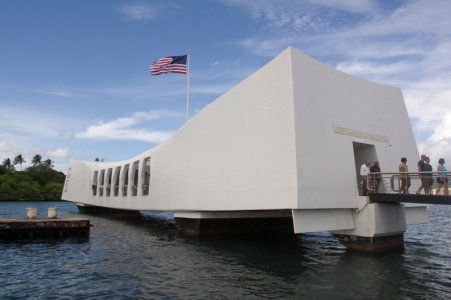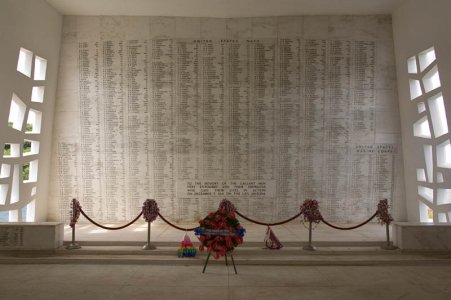It just dawned on me what today was.
Is there anybody in here who was even alive, much less remember living through the day of Dec 7, 1941?! This event would be like Sept. 11th for me.
____________________________________________


Pearl Harbor Anniversary Marked by Tributes
PEARL HARBOR, Hawaii — With U.S. troops fighting in Iraq and Afghanistan, Americans marked the anniversary today of the Japanese attack on Pearl Harbor with a salute to the nation's resilience 63 years ago.
"It was a day when weaker souls would have surrendered," Sen. Daniel Inouye, D-Hawaii, said of the Dec. 7, 1941, attack that thrust the United States into World War II. "It was a day that gave real meaning to our name the United States of America."
He added: "Today, the obstructions and challenges are many -- the ugly voices of hatred and the unconscionable actions of terrorism around us intending to make us afraid."
Inouye, a Japanese-American recipient of the Medal of Honor, spoke to more than 1,000 people gathered at the USS Arizona Memorial visitor center to commemorate the attack.
Just 17 and living in Honolulu at the time of the attack, Inouye lost his right arm serving in Europe as a member of the Army's distinguished 442nd Regimental Combat Team, made up almost entirely of Japanese-Americans.
"The story of this day must be repeated, not only to recall the threat and destruction, but it's important to remember the resilience and the unwavering spirit of the American people," he said.
A moment of silence at 7:55 a.m. marked the exact time when the Japanese bombs began to fall, killing more than 2,000 Americans. Hawaii Air National Guard jets flew overhead in the missing-man formation.
On the eve of the anniversary, a dwindling number of survivors returned to the site of their most haunting memories to honor the 429 dead from the USS Oklahoma, which capsized after being struck by Japanese torpedoes. The Oklahoma suffered the second-highest number of Pearl Harbor casualties behind the USS Arizona, which lost 1,177 crewmen.
A new permanent exhibit on the Oklahoma at the USS Arizona Memorial opened to the public today. Survivors of the USS Oklahoma are pressing for a permanent memorial.
In all, about 2,390 people were killed in the surprise attack
Is there anybody in here who was even alive, much less remember living through the day of Dec 7, 1941?! This event would be like Sept. 11th for me.
____________________________________________


Pearl Harbor Anniversary Marked by Tributes
PEARL HARBOR, Hawaii — With U.S. troops fighting in Iraq and Afghanistan, Americans marked the anniversary today of the Japanese attack on Pearl Harbor with a salute to the nation's resilience 63 years ago.
"It was a day when weaker souls would have surrendered," Sen. Daniel Inouye, D-Hawaii, said of the Dec. 7, 1941, attack that thrust the United States into World War II. "It was a day that gave real meaning to our name the United States of America."
He added: "Today, the obstructions and challenges are many -- the ugly voices of hatred and the unconscionable actions of terrorism around us intending to make us afraid."
Inouye, a Japanese-American recipient of the Medal of Honor, spoke to more than 1,000 people gathered at the USS Arizona Memorial visitor center to commemorate the attack.
Just 17 and living in Honolulu at the time of the attack, Inouye lost his right arm serving in Europe as a member of the Army's distinguished 442nd Regimental Combat Team, made up almost entirely of Japanese-Americans.
"The story of this day must be repeated, not only to recall the threat and destruction, but it's important to remember the resilience and the unwavering spirit of the American people," he said.
A moment of silence at 7:55 a.m. marked the exact time when the Japanese bombs began to fall, killing more than 2,000 Americans. Hawaii Air National Guard jets flew overhead in the missing-man formation.
On the eve of the anniversary, a dwindling number of survivors returned to the site of their most haunting memories to honor the 429 dead from the USS Oklahoma, which capsized after being struck by Japanese torpedoes. The Oklahoma suffered the second-highest number of Pearl Harbor casualties behind the USS Arizona, which lost 1,177 crewmen.
A new permanent exhibit on the Oklahoma at the USS Arizona Memorial opened to the public today. Survivors of the USS Oklahoma are pressing for a permanent memorial.
In all, about 2,390 people were killed in the surprise attack






